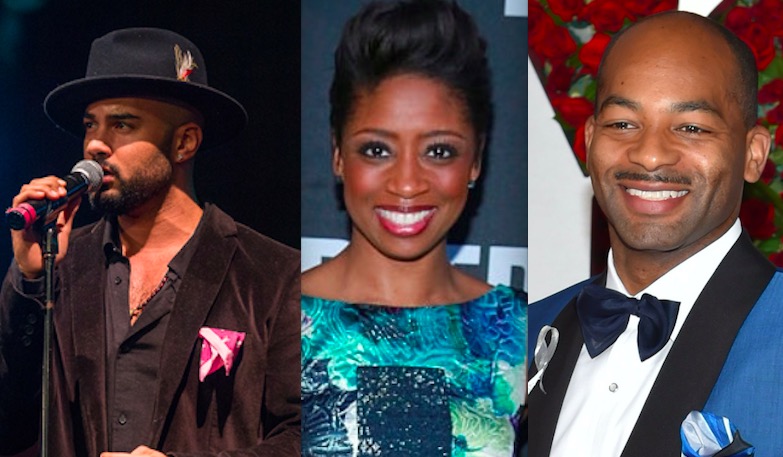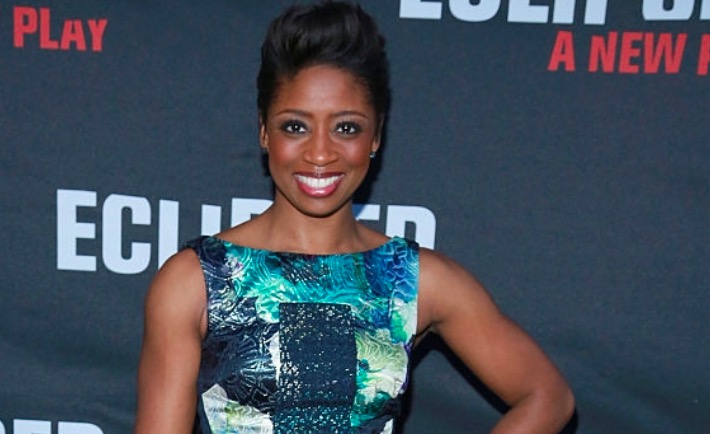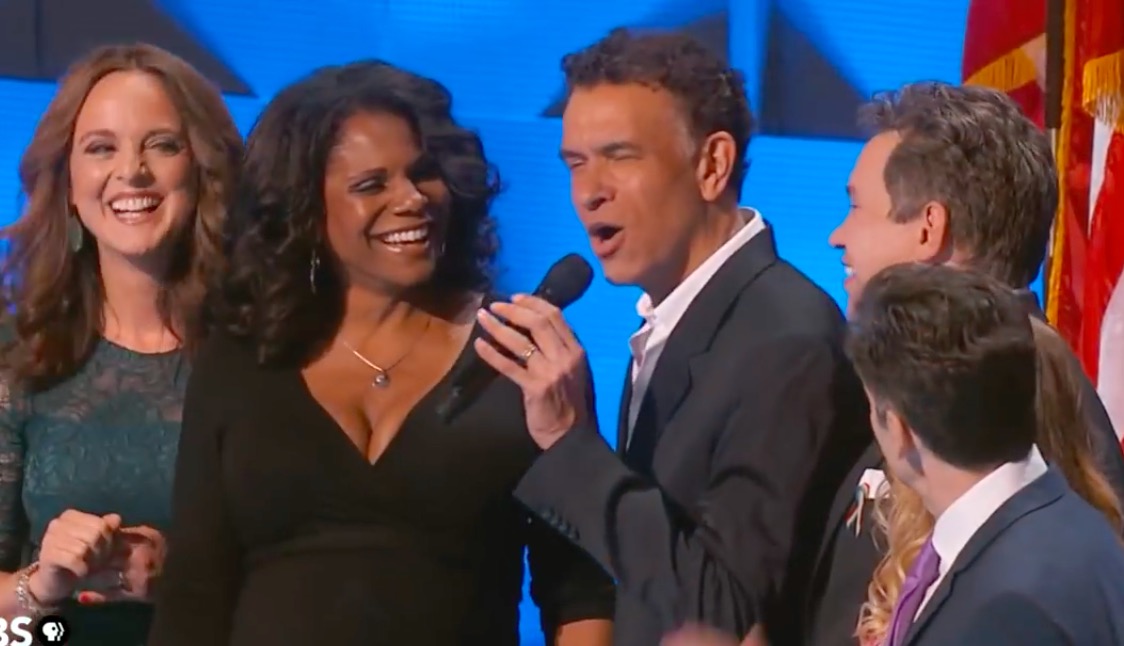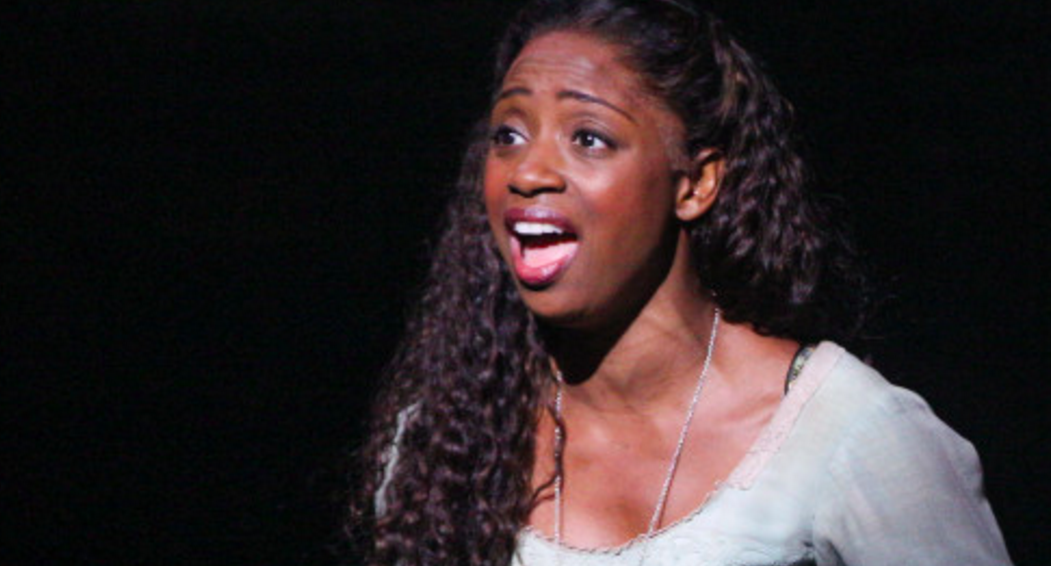

Features
Montego Glover Talks Les Misérables, How She Keeps Going & More
Published
10 years agoon
Montego Glover is a consummate Broadway professional. She recently appeared on Broadway in It Shoulda Been You, which played its final performance on August 9. She earned a Tony nomination in 2010 for Memphis and made her Broadway debut in The Color Purple. Currently, Glover plays the role of Fantine in Les Misérables. Broadway Black had an opportunity to speak with her about her career, the tragic passing of Kyle Jean Baptiste, and what she sees on her horizon.
Broadway Black (BB): You’ve had such a great career as a musical theater performer. But you’re also a concert artist and a dramatic actress on television. Is there one medium that you prefer? How are they different for you?
Montego Glover (MG): There isn’t a medium that I prefer. I want to be an actress and as long as I get to do that, I’m happy. The media are different in that there are basic skill sets that apply in television that don’t apply on stage. For example, in television we roll, play to the end and do it again. In the theatre, downbeat is at 8pm and we keep going until intermission. There is much more of a continuum. We also have a live audience, which is terrific and engaging and exciting with upwards of 100 people experiencing the story in that moment. In television we have crystalline moments in TV but there is less of a continuum.
BB: You’ve been nominated for a Tony and several other awards and you’ve won a Drama Desk and Outer Critics Circle Award. Do nominations and winning awards change either your perspective or your career opportunities?
MG: Awards are lovely. In the end, as an artist, it is really nice and wonderful to be recognized for the work that you do, because I don’t know many artists who aren’t working hard. Being nominated and winning is tremendous because you’re being recognized at the highest level for the work. But just because you haven’t won or been nominated doesn’t mean that you aren’t working hard or are not deserving. Awards give a feeling of accomplishment for the actor’s career. But your work is always growing and your skills are sharpening. So moving forward, you have other galaxies to explore. The award makes it easier in terms of your level of confidence. And it has nothing to do with outside people. That’s how I process it. As your career grows, you acquire more heavy hitting awards. That’s the highest level. So I am able to go forward and discover other opportunities, no matter how someone else categorizes me.
BB: You were raised in Chattanooga, TN and you’re an alum of Chattanooga School for the Arts and Sciences. You also received a BFA from Florida State. Does your background play a part in your choice to be a performer?
MG: Growing up in the south, everyone is musical. Everyone can sing. It’s not an odd or unusual thing. It lives in our culture. There is beautiful music founded in the struggle of African Americans and their lives. Through the Baptist church, for example, there is gospel music. So it is very much a part of breathing. It’s woven in. And I always loved that.
BB: You’ve appeared in It Shoulda Been You and Les Miserables this year – two dramatically different roles. How would you describe the transition from one to the other and how do you manage it?
MG: The transition was FAST. It was kind of an unbelievable, amazing “How great is show business?!” transition. I was slated to close It Shoulda Been You August 7 (Friday), two days earlier than the rest of the company, because I had a concert that same weekend with the Summer Symphony in Sun Valley. For that I spent 48 hours in front of 5000 people with a 100-piece orchestra. So I closed the show on Friday, performed in Sun Valley, got in late on Monday and started Les Miz rehearsals on Tuesday.
Energy is never off. I find myself vibrating at a higher frequency because that’s a productive space. There is a terrible white space that doesn’t get the right things done. So find the right pitch for you. I happen to move through space at a higher pitch and that works for me. The way it works for me is planning. I have to plan it. Part of that is scheduling, being in close contact with my team. I have a group of people: a manager, two sets of agents, a publicist and a business manager. I have learned how to make things work to allow these people to make things work. Delegation helps me to have energy and artistic space to devote to things I want to work on. The people I work with have to have the right sensibility and the right vibrational level.
Another important facet of that is good old-fashioned take care of yourself. When I gave the commencement address at alma mater I told the graduates to fill your body and mind with good and nutritious food. Take care of yourself. I shop at the Farmers Market. I cook at home. I look for items that are responsibly grown and caught. I have no alcohol during the week. The demands on my body are such. That is for my body. For my mind, I have read The Power of Now or The Seat of the Soul by Zukav or a book about Mandela. I also read Les Miserables for research purposes. Read things of value. What goes into my mind is not noise and clutter, but something of use. I love poetry – whether it’s Nikki Giovanni or Dr. Seuss. But it’s important to me that what goes into my mind is always something I can use and not other people’s stuff.
The last thing I’ll say is recognizing the importance of saying No . I get asked to do a lot things. People approach me to do their projects. It’s wonderful that people respond to my work and I love that, but there’s only one of me and I can’t be everywhere and there are times that I have to say No.
BB: How did you prepare for Fantine after playing Annie Shepard? Even before you appeared in the role, people were gushing with anticipation over what you would bring to that stage as Fantine. What does it mean to you take on such a famed role?
MG: It’s kind of a bucket list item. Les Mis is a seminal work, a masterpiece. It’s been a part of so many lives and careers have been enriched and made by this piece. This role is a jewel because of Victor Hugo and because of Schomburg. It’s thrilling every night to step into the world of the play in her shoes. I find something new every night. To prepare is to be willing to dig into my emotional well to find what she needs to be properly told every night. Her fall is spectacular so if you’re not in good enough shape, it can harm you. She takes a beating on a street so being to hold that up and not come off stage truly broken is my responsibility. I must be in proper physical shape and also emotionally willing and open to her and whatever she requires. This is being responsible to her story telling. She is a woman in our lexicon and painting the picture of her is very important. I like to come with new information from the novel or a new strain of music I’ve heard from the score and come like a blank canvas thru the stage door. Willing and prepared.
BB: Melba Moore was there on your opening night. Did she have any words of encouragement or advice for you?
MG: She said, “Enjoy it, honey.” And I said “thank you.” And she gave me the knowing look. She knew where I was and what I was doing.
BB: Fantine is such a complex character. Is it cathartic when you take on a character that complex and expel and expend all of this emotion?
MG: You have these thoughts and performances and eight times a week you get to try them. She speaks to me and shows me another bit of herself every single time. It requires a level of emotional and physical energy. At the end of the performance , I feel spent. Recharging comes from what I’ve discovered about her between performances. Having some time to sit and think it through. Addressing those changes come with experience. Things come from rehearsal and they need time to germinate, settle and grow. You have to process what you can do quickly but also wait patiently for it to flower.
BB: Of course everyone was devastated by the recent tragic death of Kyle Jean Baptiste right before your run began. How did his passing affect your performance and that of your fellow actors?
MG: It was devastating to everyone in the company. Actors, unlike any other people or profession in the world, work closely and organically together. Our work requires that we be kinetically connected in that way. A loss of any member in the company is hard because it feels like something has been taken away from you. The company was heroic and empathetic. We reached out and held on. Having the work that brought everyone together helped, in the face of his passing. Continuing to work was the best possible thing because it required everyone to be together and do the work that brought us all together. Inside the Imperial Theatre, everyone was holding each other up and making sure we were all working through it together. The larger community came to our aid, sent wishes and condolences, and reached out to be helpful so we knew they were standing right along with us as we were experiencing the loss. He was present at my Put In and I saw him go on and it was the last time I saw him. What I was looking forward to was a week to work together.
BB: How would you explain to someone who has no experience with performance and music what is so exciting about the process for you?
MG: I’m always looking for a person who has a life, an arc, a range of colors or emotions they need to express. I’m looking for wonderful music, a fun and exciting or heartfelt tune, lilting melodies, and a good story to tell.
BB: What do you think will be the next great challenge for you in your career? If you were setting your next set of goals, what would they be?
MG: I’d like to play all of Shakespeare’s women. I would love to play all of Sondheim’s women. It would be thrilling to dig into the musicality and the richness of his work. I’m also interested in originating works so finding new projects and stories we haven’t told yet or marvelous icons who have fantastic stories. There are also great projects in studios and independent films.
BB: What words of advice or encouragement would you give to young Black actresses?
MG: Again, fill your mind and body with good and nutritious food. I’m so excited for young Black men and women right now in the world of art. It’s a fantastic time to be us doing what we’re doing. The stories that have been written point directly to our gift. I enjoy the idea that there’s a place where they belong in that story or play.
There are also the practical parts of being an actress – mind your money. It’s important as a professional; your art must meet your commerce. I’ve discovered that if you pay attention to it and be mindful about it, it can serve you well. The training is over; the artist must fund their lives and their art. Minding your money is important.
Keep your word. When you say you’re going to do something, you have to do it. Make your decisions carefully and mindfully. You have to say no, and you have to mean it. Make a decision and stand by it. Tell the truth, in your life and in your art. It builds integrity and it is priceless and worth its weight in gold.
Remember that you are unique. There is no one like you. But you are also replaceable. Be empowered by that. I’ve tried and tested these ideals over my career. They continue to be true and right and continue to evolve over time. You are full of your own marvleousness in your 20s and it morphs into another place. When you know you are unique and replaceable, it will give you the confidence for other projects that you should be reaching for. As you grow and learn, that same tool can serve you in a totally different way. And keep in mind that lesson. There are those who are willing to stand exactly where you are.
If you enjoyed this article, you’ll also enjoy her interview on Sirius XM’s Behind the Curtain with Keith Price. Great stuff!
Features
Photo Exclusive: Step into The Light with Broadway Black
Published
7 years agoon
February 21, 2019
Have you seen The Light by Loy A. Webb at MCC Theater? If you haven’t, then you need to and Broadway Black has got you. Join us on SUNDAY MARCH 3rd for the BWAYBLK Experience!
Use code BWAYBLACKMCC and pay $35 for any seat on Mar 3 at the 7:30 performance
Not every marriage proposal goes as planned. LOY A. WEBB’s THE LIGHT introduces us to RASHAD and GENESIS on what should be one of the happiest days of their lives, but their joy quickly unravels when ground-shifting accusations from the past resurface in this gripping two-character drama. Can their relationship survive the growing divide between them over who–and what–to believe?
Also, get into this amazing photo series of playwright Loy A. Webb & the cast of her play The Light. Photos by Curtis Brown were taken in the new elegantly designed and strategically welcoming Robert W. Wilson MCC theater space. Located in midtown New York on 52nd and 10th ave (511 W 52nd ST
New York, NY 10019)
On another tip, some really dope creatives will do a talkback after the Saturday matinee performance that you might be interested in attending. Make sure to RSVP.
Panelists include: Nissy Aya, Cristina Pitter, Alicia Rodis & Kavita Mehra
THIS WEEKEND SAT FEB 23rd
LOY A. WEBB’s THE LIGHT at MCC Theater delves deeply into one couples’ reckoning with an encounter with sexual violence that has left audiences asking: as a partner, a family member, a friend, how do we support sexual assault survivors? And what responsibility do artists have to create work that is trauma-informed? On SAT FEB 23 at 4:00 PM for an in-depth conversation about the power of allyship rooted in love and healing – in our lives and on our stages – in the face of trauma.
SAT FEB 23 at 4PM
THE ROBERT W. WILSON MCC THEATER SPACE
511 W52 ST
RSVP HERE.
Features
A Superhero On & Off The Stage, Camille A. Brown Brings ink
Published
7 years agoon
February 5, 2019
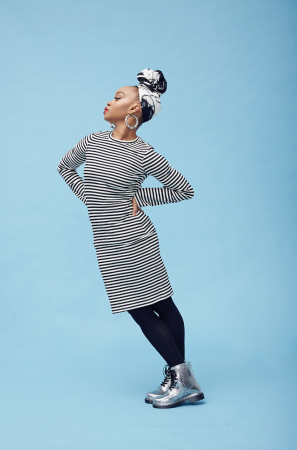
Camille A. Brown Photo by Whitney Browne
Camille A. Brown‘s dance company, Camille A. Brown & Dancers, tours nationally and internationally and will be presenting six performances featuring the debut of ink at The Joyce Theater NYC Feb 5-10th 2019.
Propelled by the live rhythms and sounds of traditional African and handmade instruments, Camille A. Brown’s ink celebrates the rituals, gestures, and traditions of the African diaspora. Highlighting themes of brotherhood, community, and resilience, the work seeks to reclaim African American narratives and is the final installment of Brown’s dance theater trilogy about identity.
In addition to her company works, Ms. Brown brings her passion for storytelling to her award-winning choreography for Broadway, Television, and Off-Broadway. Productions include Tony Award Winning Once On This Island, (Drama Desk, Outer Critics and Chita Rivera award nominations), Emmy Award Winning Jesus Christ Superstar Live on NBC, A Streetcar Named Desire, Choir Boy, the upcoming Magic Mike The Musical, PAL JOEY.
We had the chance to probe a little bit into the world of Camille A. Brown, and we’re grateful for the insight and wisdom with which she was able to bless us. Check out the interview below along with an excerpt from ink.
Broadway Black (BB): After forming the idea, what was the process of building ink?
Camille A. Brown (CAB): After the creative process for BLACK GIRL: Linguistic Play, I held a desire to dig even deeper and tell more stories of ritual, gestural vocabulary, and traditions of the African Diaspora. I was immediately drawn to two albums that had a significant impact on me when I was growing up. The Miseducation of Lauryn Hill by Lauryn Hill, and Like Water for Chocolate by Common. I tasked myself with creating a movement language that embodied the same raw authenticity, and vulnerability that fuels those lyrics and music.
As I began to develop the concept for ink, I wanted the dancers to represent superheroes. I couldn’t figure out why I had the urge to play with this idea until I read Question Bridge: Black Males in America. One of the men interviewed said, “I see Black people as comic book heroes because they always keep rising.” That was it! It is about showing that in our basic survival, and natural attributes we have superhuman powers. Powers to shift, overcome, transform, and persevere even within an often hostile environment. The seven sections of ink represent super powers of spirituality, history and heritage, the celebration of the Black female body, Black love, brotherhood, exhaustion, and community.
The process involves a deep collaboration with the dancers and my direction is guided by their choice making.
The space is very organic and fueled by research. My dancers, musicians, dramaturgs, and I are in constant dialogue throughout the process about the work and how it’s progressing. We don’t move forward unless we’re all on the same page.
We are building the work together. As a disclaimer, I let everyone know the process will be exceptionally tedious. Like a fine comb, I go through each beat, gage the temperature of storylines, and make sure the movement and music are always in conversation (whether aligned or in contrast).
BB: What made you want to start your own dance company and how have you sustained?
CAB: I found my love of choreography in college because I struggled with body image, and found that creating my own voice was a safe and empowering space. After graduating, I danced with Ronald K. Brown/Evidence for 5 seasons and during my second year with The Company, a friend from college (Amy Page) sent me a flyer for the Hubbard Street 2 competition which picks 3 choreographers to create work on the Company. I was chosen! That gave me the encouragement to pursue choreography. My first idea was to take an alias like female writers used to do because even at 22, I knew the playing field was not leveled and women (particularly black women) did not get as much exposure as male choreographers. Dance is revealing and vulnerable so taking an alias wasn’t a realistic option. People would have to see me as I am, but I also needed the confidence to withstand the obstacles. Not only that, having a company seemed daunting.
Ron wore so many hats. He was the director, choreographer, teacher, and also took on administrative duties. He never got a break. I wasn’t confident I could handle all of the duties.
I set work on other companies, but soon realized it wasn’t for me. 1-4 weeks working with a Company wasn’t enough time for me to really hone my skills, find my voice, and discover my personal creative process. I desired a more intimate relationship and space with my dancers and collaborators. I had my first show at Joyce SoHo in 2006, and committed to having a company in 2010.
What sustains CABD is my team. I have a company agent (Pamela Green), Managing Director (Indira Goodwine), Company Manager (Michelle Fletcher), and a production team who holds things down.
In the beginning, I was doing ALL the jobs! As time went on, my team slowly formed. It’s really about patience and perseverance. Nothing happened over night and everything is a progression.
BB: How have you had to be a superhero in your own life personally and professionally?
CAB:
Personally
Last year, I had a life-threatening experience. My appendix ruptured on tour. Appendicitis is when they remove your appendix before it ruptures, but mine actually did and the fluid was in my system for at least a week. I survived the “fatal” stage- which the doctors told me isn’t common. This started a very long year and a half which included 4 hospital stints and two surgeries (my second one was in April). This all happened during Once on This Island (I was in the hospital the first week of rehearsal and had my first surgery during tech), Jesus Christ Superstar Live, and my Company touring. I had to access my “superpowers” and push through, but thankfully I had my team and community to help me.
I’m going to be writing about the entire ordeal because it was such an integral part of my life. People see the “success”, but if they only knew the hardships I had to overcome to get to the other side.
Professionally
Being a Black female Choreographer and Director is hard. People ask me to do I feel like I’ve arrived. Absolutely not. I’m still Black and a woman- two underrepresented groups- particularly in theater. The playing field is still not leveled and I’m clear I have to work twice as hard.
I’ve had to build up strength and confidence. It is an ongoing process of gathering those superpowers. In many spaces, I’m sometimes the only woman (I was the only woman on the creative team for Jesus Christ Superstar Live), and the only black person in some rooms.
Recently two black girls at different events asked me the same exact question: How do you navigate spaces where you’re the only one.
It’s quite easy to feel intimated and shrink yourself. I know I have done that in the past. Now, I’ve found if I think about the black women before me in similar spaces, black women who are currently in similar spaces, and the next generation of black women coming after me, it makes me more confident. When it’s not just about you, it becomes a responsibility.
And even when I don’t feel like I have any superpowers, this happens…
and it refuels and encourages me to keep going. Someone is always watching.


